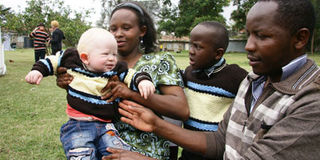Cost challenge of albinism skin lotion

Fred Muthua (Right) and Elizabeth Wambui hold their 18 month old son Austine Kinyanjui who was born with albinism. His brother George Ngigi, 7 looks on. Photo/BILLY MUTAI
What you need to know:
- Prohibitive price means many people living with lack of skin colour never get to use sunscreen protection, leading to suffering
- In December last year, the government set aside Sh100 million for a new albinism fund to provide sunscreen lotion to people lacking skin pigmentation.
- Albinism is an inherited genetic condition that reduces the amount of melanin in the skin, eyes, and/or hair. Melanin is the photo-protective pigment that shields one from the sun’s harmful ultraviolet rays.
With the swiftness of a one-year-old, he slides from his mother’s lap keen to discover his new environment. Despite being well protected under the tent, he insists on crawling beyond the shade, which might affect his sensitive skin.
Little Austin Kinyanjui has albinism, a genetic skin condition that leaves one with a pale skin that is particularly sensitive to the sun.
Little Austin is now learning to walk and will take every opportunity to improve on his crawling skills, oblivious of the danger of exposure to the sun’s rays.
Calls and beckons by his older sibling, seven-year-old brother George Ngigi, to lift him back to his mother’s warmth are met by a frown, a sign of protest. He crawls away, undeterred.
Luckily, today he has a coat of sunscreen lotion on him.
The cost of sunscreen lotion that is meant to protect the skins of persons with albinism like Austin is prohibitive, thus unavailable to at least 95 per cent of them.
In July this year, the Albinism Society of Kenya went to court after the government awarded a tender to Suken International to supply sunscreen lotion without considering the best prices and quality of the product.
In December last year, the government set aside Sh100 million for a new albinism fund to provide sunscreen lotion to people lacking skin pigmentation.
Under the proposed Sun Screen Lotion Programme, a monthly provision of a 200ml-bottle of the lotion would be provided to persons with albinism.
However the programme failed to take off due to procurement problems.
“The sunscreen programme is yet to be rolled out due to problems with the quality and pricing of the lotions,” nominated legislator Isaac Mwaura, who is also the national co-ordinator of the Albinism Society of Kenya, said.
VISION PROBLEMS
On Sunday, Austin was one of the hundreds of persons with albinism at an event organised by the Albinism Society, aimed at screening them for skin cancer and vision problems.
People with albinism usually have poor vision due to insufficient melanin in their eyes.
Albinism is an inherited genetic condition that reduces the amount of melanin in the skin, eyes, and/or hair. Melanin is the photo-protective pigment that shields one from the sun’s harmful ultraviolet rays.
This results in physical characteristics like white or light blond hair, violet to hazel eyes, and a pale skin that is particularly sensitive to the sun.
Little Austin’s mother, 27-year-old Elizabeth Wambui, says that despite albinism, his son is a healthy baby and she has learnt to protect his sensitive skin.
She also urges parents with children with such conditions to be proud of them and accord them the love and care as they are a blessing from God.
“I love my sons equally, and whenever I get the time to share about albinism, I explain that this genetic condition can be in any family,” says Elizabeth, who says her two cousins had albinism.
She quit her job as an Early Childhood Development teacher one year ago in order to take care of Austin, who needed special care.
“I realised that leaving him with the house-girl when he was young was not good because he might be exposed to the sun, which would affect his skin,” Elizabeth told the Nation in an interview on Sunday.
She hopes to resume her job in January next year, when Austin will be old enough to be left with a trained househelp and relative who understands his condition.
“We are already using sunscreen lotion to protect his delicate skin, but at Sh1,800, it is restrictive and is only available at selected supermarkets in Nairobi,” Austin’s father Fredrick Muthua who works as a painter in Kikuyu, said.
“Last month we buried one of us in Kikuyu Town because he had never used sunscreen since birth largely because he could not afford it,” Mr Muthua added.
The society hopes to roll out the programme to screen persons with albinism for skin cancer and eyecare services at no cost.
HEALTH INITIATIVE
Funded by the Albinism Society of Kenya, Valentis Foundation and the Kenya Institute of Management, the initiative will target over 30,000 persons with albinism countrywide.
“We hope to hold it once every three months across various towns and we urge partners to support our course,” he added.
In Tanzania, the lives of people with albinism are threatened, not by the condition, but by those who believe that their limbs and organs have magical powers that can attract great wealth.



